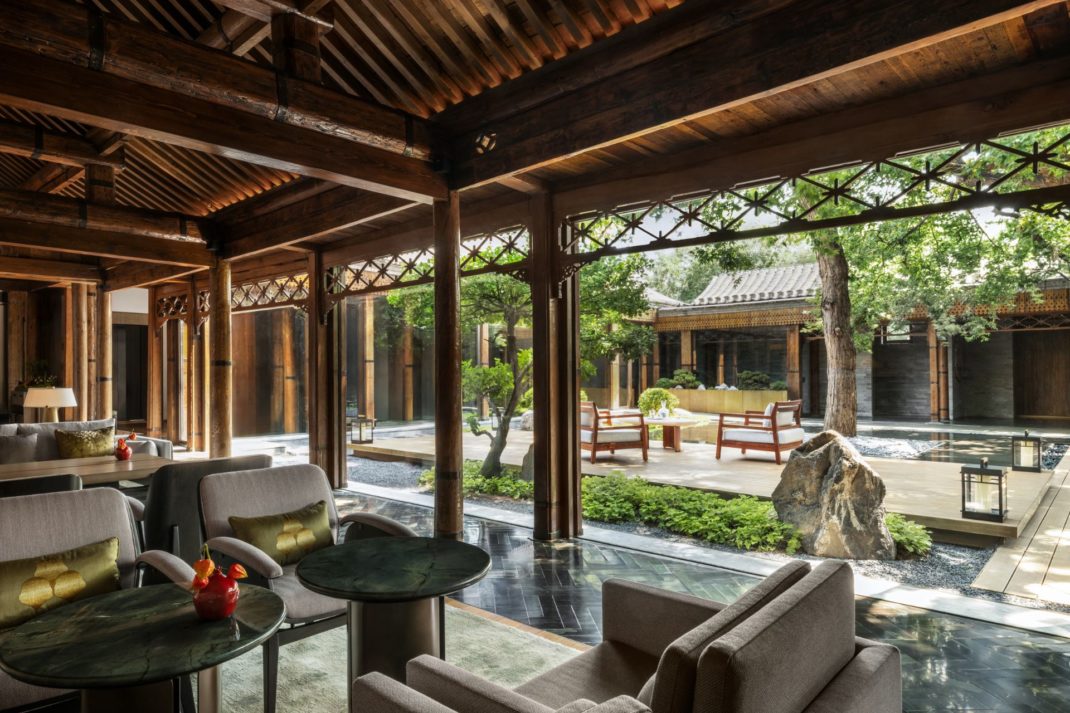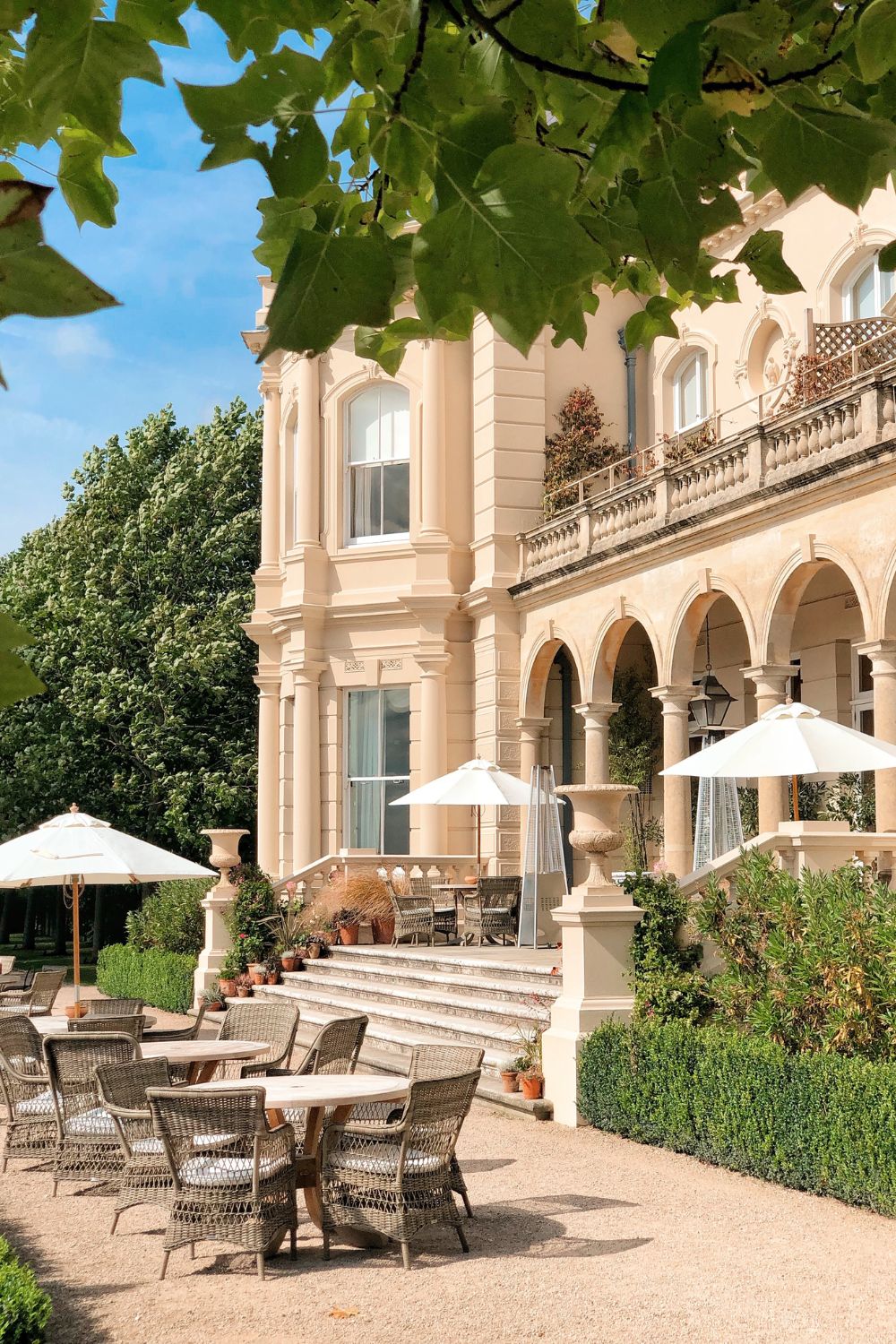
These Are The Best Heritage Hotels For Relaxing Staycations
By
10 months ago
Book in for some R&R at these historic spots
Heritage hotels are good for your health, it would seem. A recent study by Historic England found that visiting sites such as historic buildings and monuments – in particular, Grade II-listed properties – can help to reduce stress and improve life satisfaction. It’s little wonder when you consider many of these places embody exemplary workmanship and traditional values, while providing a sense of permanence and identity in a rapidly changing and uncertain world. Juliet Herd explores four proudly reimagined luxury properties that connect guests to the past.
The Best Heritage Hotels
Beaverbrook
The House
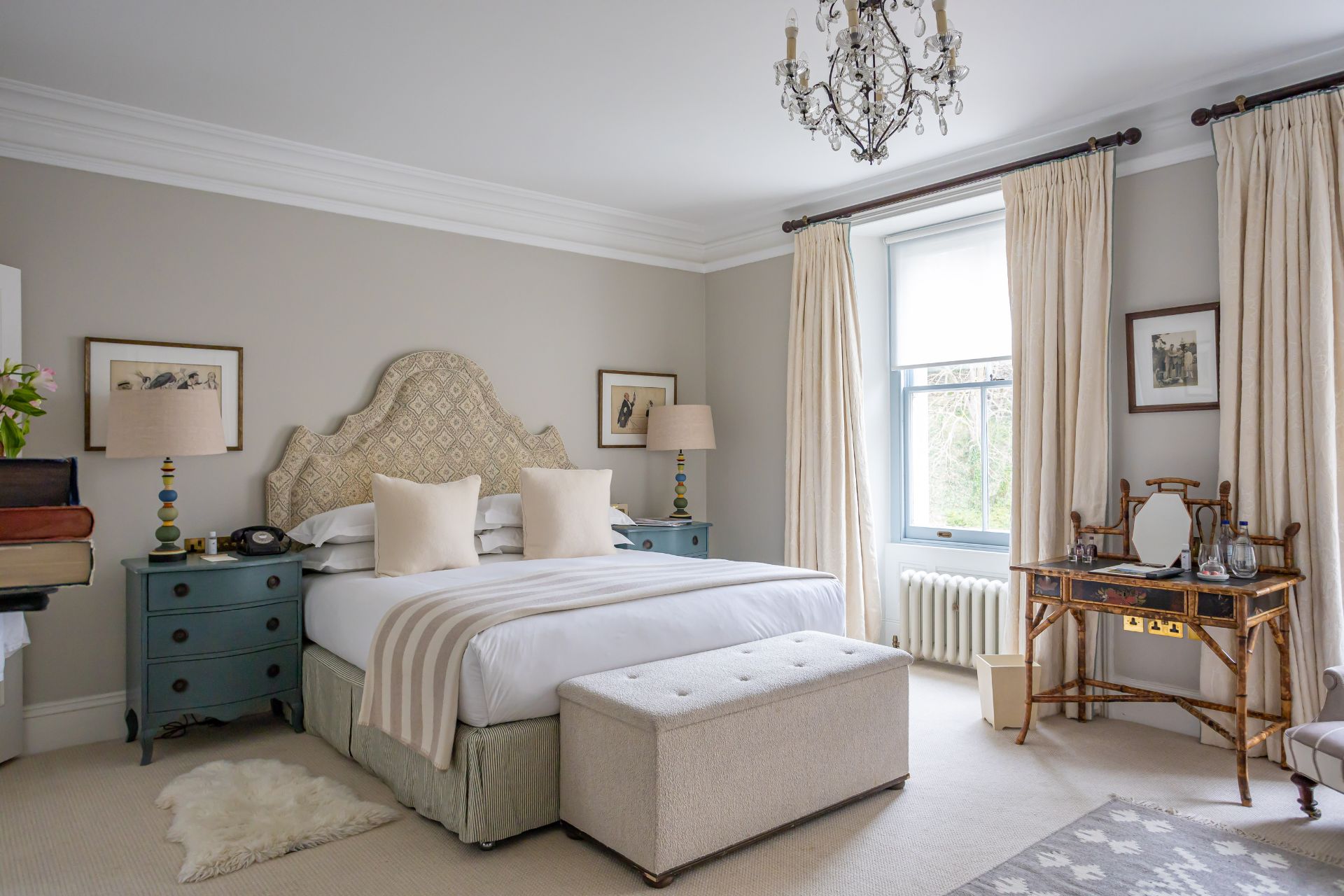
If you stand on the terrace of Beaverbrook mansion and cast your eyes towards the horizon, you will be treated to uninterrupted views across the 470-acre estate’s Italian gardens to the Surrey Hills beyond. Remarkably, the vista has remained unchanged since the property was built in 1866.
It is one of this quintessentially British country house hotel’s many nostalgic charms: literally drenched in history, it pulses with stories of political intrigue, glamorous liaisons and the personalities of some of the 20th century’s most powerful players, including former owner Lord Beaverbrook.
Considered the ultimate insider, the Canada-born wartime cabinet minister and newspaper baron Max Aitken was at the centre of British politics and society for more than 50 years, and filled the house –his pride and joy – with guests ranging from Winston Churchill (a regular) and John F. Kennedy to Elizabeth Taylor and the Duchess of Windsor. One of the thrills of staying at Beaverbrook, which opened as a luxury hotel in 2017, is discovering which rooms (named after their illustrious occupants) were allocated to which guests, relative to their perceived status or importance to their playful host. So, while the Kennedys were afforded a suite with unrivalled views, Wallis Simpson, H.G. Wells and Lady Diana Cooper were accommodated at the top of the house – albeit in some style! Interestingly, Churchill chose to sleep in a back bedroom. Now one of the estate’s most popular rooms, it features the former prime minister’s original bathroom as well as his secret escape passageway – during WWII the house was considered a target for enemy fire as the entire war cabinet could often be found there plotting military manouevers.
Beaverbrook’s transition from private estate to lavish Grade-II-listed, 18-room hotel has been seamless thanks to the curatorial flair of creative director Sir Frank Lowe and sympathetic interior design touches of Susie Atkinson (ex-Soho House) and Nicola Harding (Beaverbrook Town House). Visitors are made to feel instantly at home – you can run up and down the dizzying Victorian staircase with original domed atrium, pore over Lord Beaverbrook’s collection of leather-bound books in the cosy library, recline on an oversized sofa in the grand morning room, where tea and cake are served every afternoon, and kick back in the cosy cinema room – Britain’s first. The cinema’s distinctive art deco lights were gifted by former US president Kennedy.
In the opulent Sir Frank’s Bar, you can sip martinis inspired by the likes of Elizabeth Taylor and the late Queen Elizabeth II, and nibble on Japanese-style bar snacks such as edamame and shitake bao buns. There is plenty to feast the eye on, too – the walls are lined with 350 paintings by the Victorian botanical artist Marianne North.
The Japanese theme is continued in The Dining Room restaurant, overseen by head chef Wojciech Popow, whose signature dishes include charcoaled Wagyu with juniper miso and sansho pepper and turbot nigiri with wood ants and marigold oil.
The Village
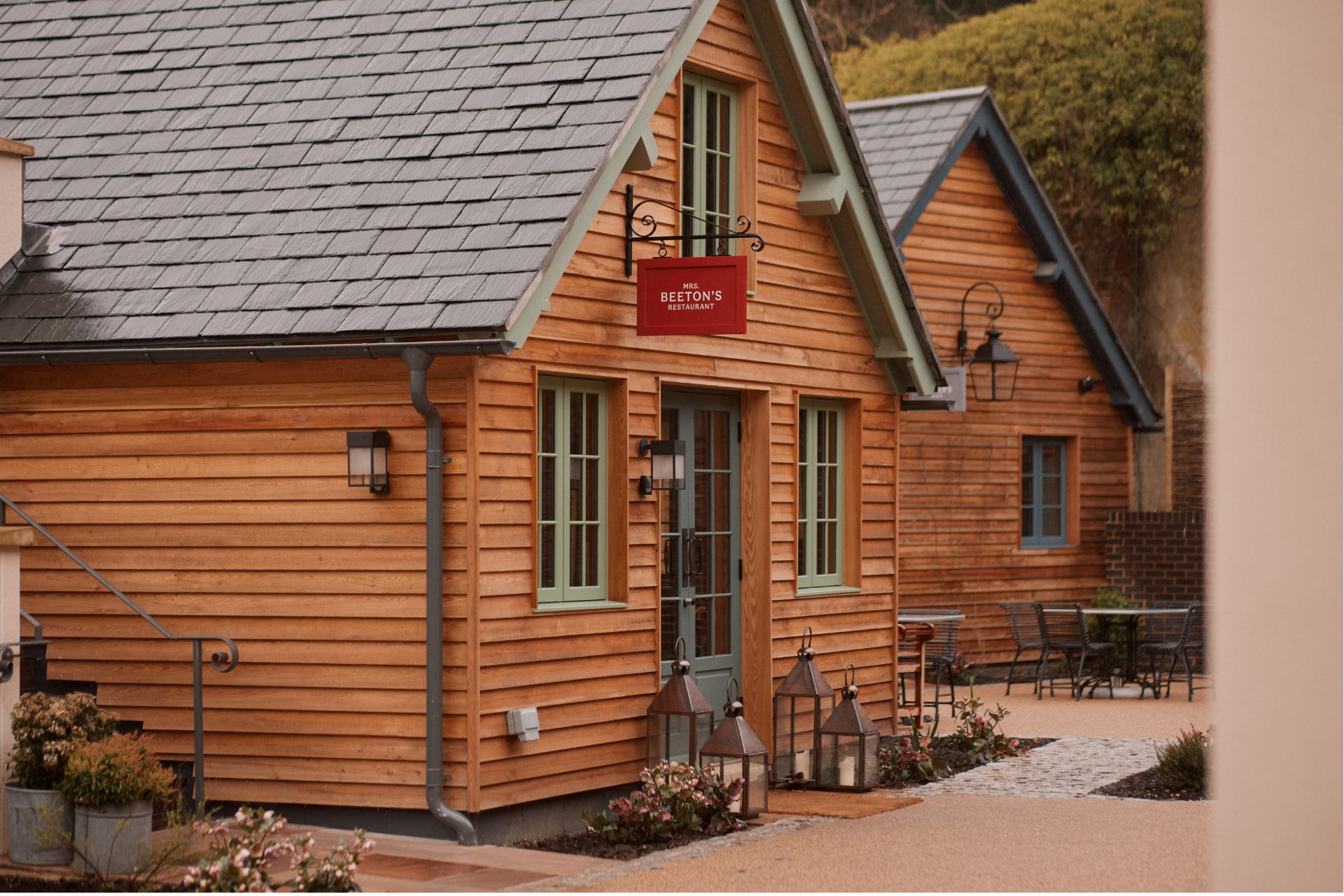
Benjamin Wheeler
Beaverbrook’s newest opening is The Village, a recreated traditional English village featuring 21 guest rooms housed across a collection of ten super cute woodland cottages. Built on the site of the original estate workers’ abodes and launched earlier this year, the Nicola Harding-designed suites are named after literary and artistic giants of the Romantic period and the Golden Age of Literature. We stayed in the Oscar Wilde room, full of retro charm with patterned wallpaper, four-poster bed and Dorian Gray posters on the walls. Vintage Country Life titles filled the magazine rack while early Penguin editions of classics, including D.H. Lawrence’s Lady Chatterley’s Lover and P.G. Wodehouse’s My Man Jeeves, adorned the bathroom shelves.
We dined at The Village restaurant, Mrs Beeton’s, named after the Victorian culinary goddess and featuring such classic British fare as lamb chops with anchovy butter (delicious) and steak and eggs, before enjoying a moonlit stroll back to our cottage. Self-drive buggies are on hand to transport you around the property.
Adjacent to the cottages is another new offering, The Dower House, set within a walled oasis of 55 acres and including its own private swimming pool, treatment room, helipad and even an Aston Martin for guest use.
The Coach House Spa
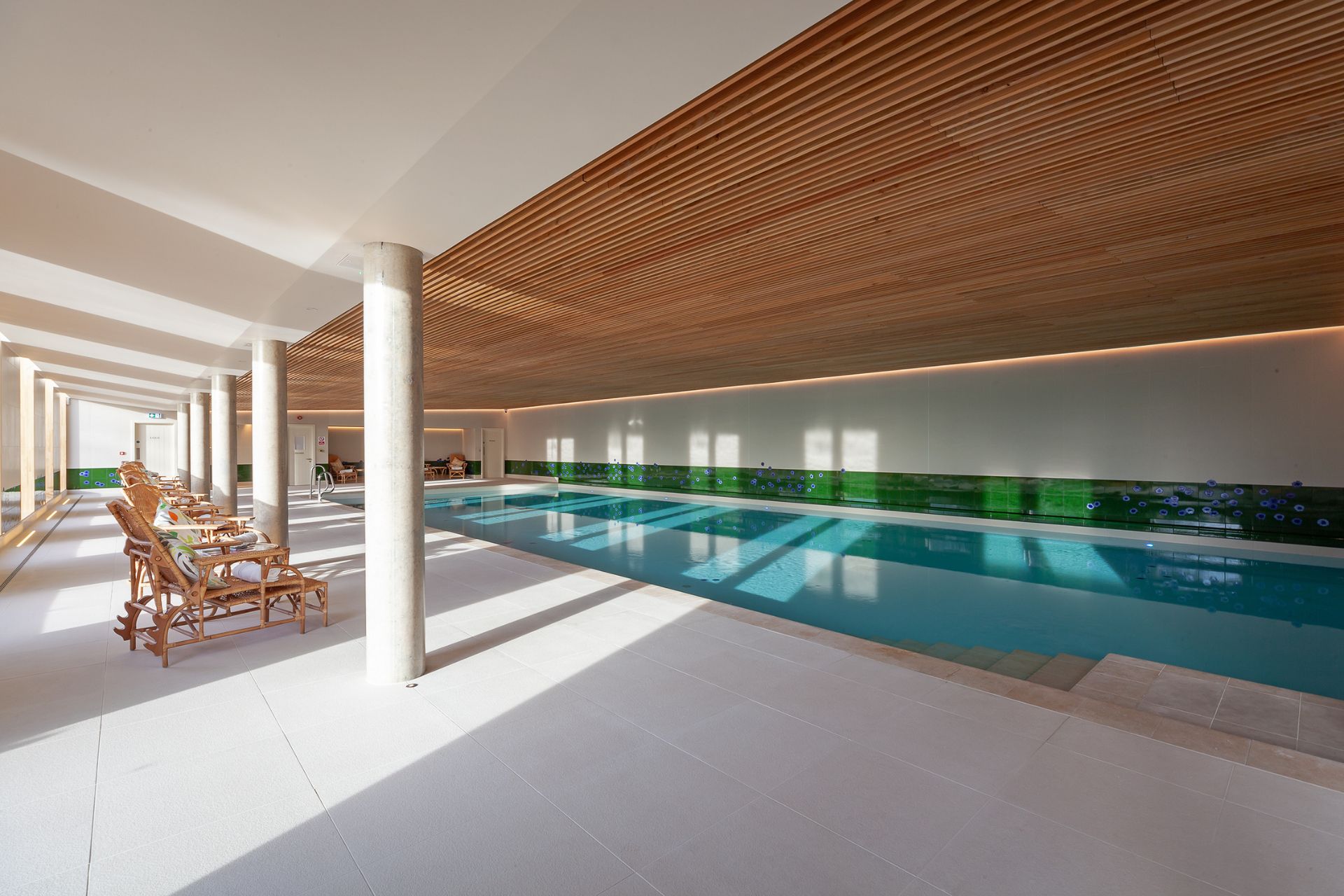
Entering The Coach House, a former stable block, is like walking into an enchanted, light-filled greenhouse with its stained-glass ceilings and blue and green ceramic tiled walls decorated with floral blooms, designed by contemporary artist Brian Clarke. There are six treatment rooms, a steam room, sauna, hammam, hyperbaric oxygen chamber and gym as well as indoor and outdoor pools. Treatments range from honey-infused facials using the estate’s own oils to a vibrational sound bodywork exfoliation and massage in the stand-alone Meadow Hut, which employs Tibetan bowls, gongs and tuning forks to relax and revive both body and mind. After your pampering session, head to the on-site Deli in your robe for super-food salads straight from the kitchen gardens and tasty wood-fired flatbreads.
Rooms from £680 per night in The House and from £475 in The Village. beaverbrook.co.uk
The Retreat At Elcot Park
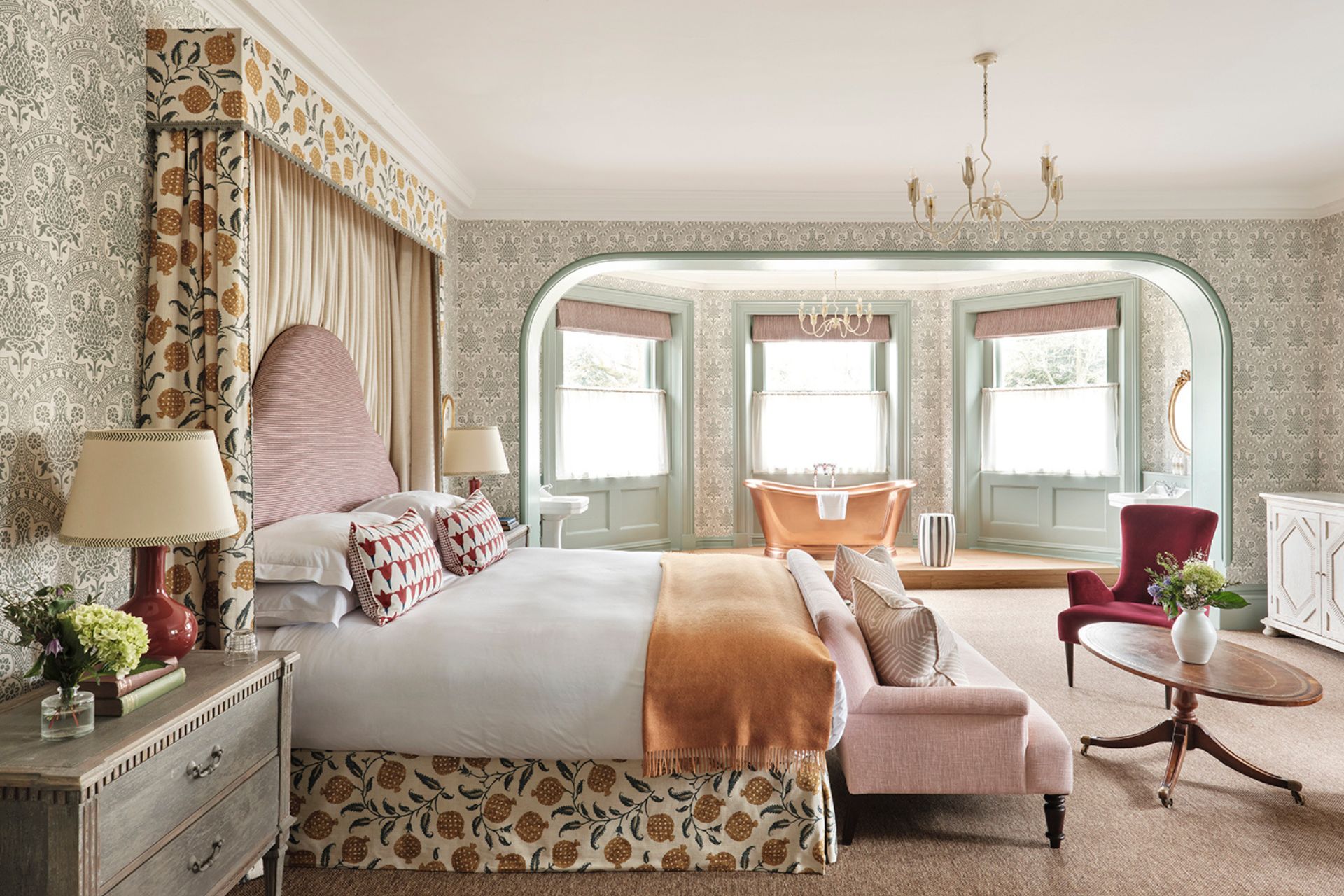
Astrid Templier
The Retreat at Elcot Park in West Berkshire perfectly embodies the ethos of boutique hotel group The Signet Collection, which aims to create ‘a new chapter for an age-old story’, in the words of managing partner Hector Ross. ‘It’s taking the shell of an old building and seeing how we can enhance it back to life,’ he adds.
When it came to restoring the Grade II-listed 18th century building, once the family home of poet Percy Bysshe Shelley, Ross consulted Historic England and devised imaginative ways of solving problems, such as hiding power sockets and USB plugs behind specially designed wood panelling.
The second in Signet’s portfolio of refurbished heritage hotels offering guests ‘memorable stays in time-honoured places’, The Retreat opened in 2022 and was promptly named Britain’s Best Hotel by The Times and The Sunday Times in their 2023 list of the UK’s top 100 places to stay. While not claiming to challenge country estate grand dames such as Clivedon House, what Elcot Park and its sibling properties, The Mitre at Hampton Court and The Barnsdale in Rutland, aim to deliver is accessible luxury.
Despite the undeniable grandeur of the pillared Georgian mansion with its sweeping driveway and Capability Brown-style grounds, there’s nothing intimidating about The Retreat. On arrival, you’re given a welcome glass of wine and invited to sink into one of the plump sofas in the main hall, which features a portrait of a wistful-looking Shelley above the fireplace. The romantic poet’s mother and two sisters, who lived in the house until the last one died in 1887, were often visited there by his widow, Frankenstein author Mary Shelley.
So far, so traditional. But once ensconced in your room (each one is named after famous former residents, including Shelley and Bushby Bacon or jockeys of note), the hotel’s personality begins to assert itself. Reimagined by London-based interior designers Taylor & Turner, the 55 bedrooms are full of quirky design details, such as indulgent roll top bathtubs, vibrant prints and an eclectic mix of modern and antique furniture. You’re also treated to complimentary King’s Ginger liqueur tipple and daily home-baked cookies – and if that’s not enough to keep hunger pangs at bay, you can raid the well-stocked 24/7 pantries on each floor at whim (refreshingly, there are no mini bars). Nine of the rooms are animal friendly (there’s also a dog basket in the main reception), and have been known to host pet rabbits as well as your usual dogs and cats.
The Signet Spa
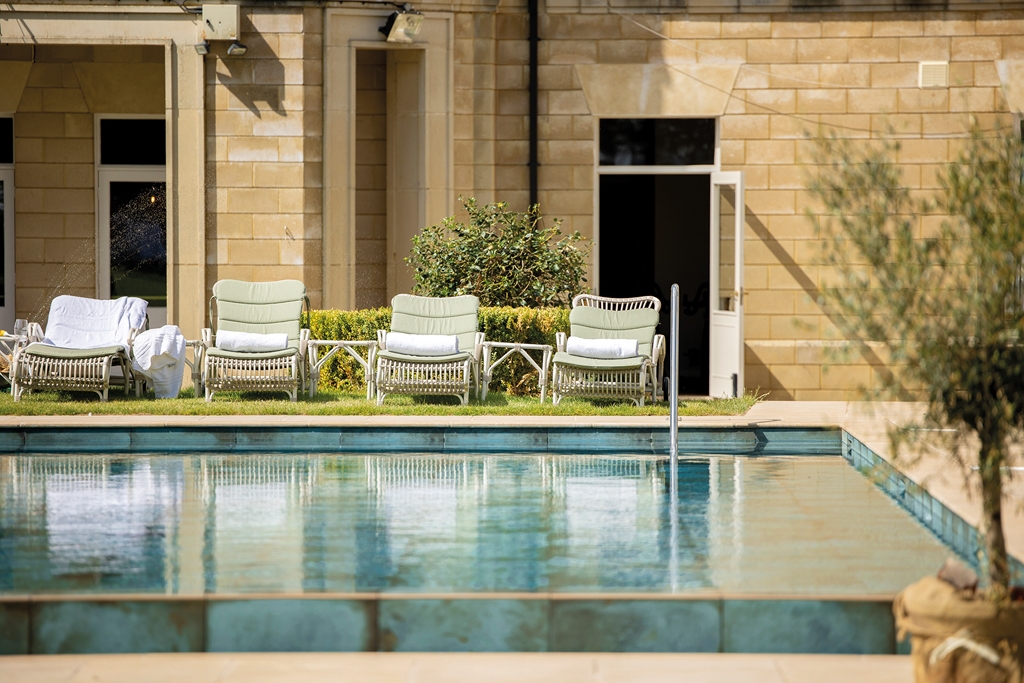
Just 40 minutes from London by train and ten minutes by car from both Hungerford and Newbury, The Retreat is ideally situated for Londoners in need of a restorative staycation and is geared to deliver exactly that. Explains Hungerford-based Ross: ‘We’ve called it The Retreat because we actually want people to take their foot off the pedal. If you want to come here and do absolutely nothing for two days, that’s fine with us. But if you want to jump out of bed and go on a 5km adventure walk, that’s available too. We’re experiential all the way through and I think that’s what makes us different.’
The Signet Spa, which offers membership and spa breaks, boasts an indoor vitality pool, salt flotation chamber, steam room and sauna, matrix gym and three treatment rooms using natural organic skincare brand Gaia. There is also an outdoor infinity pool, croquet lawn, tennis courts and children’s zone. Always on the look-out for new activities, The Retreat has recently partnered with a nearby fishing lodge for those wishing to test their trout fishing skills.
Within the hotel grounds is The Courtyard, consisting of farm shop, wine cellar and hair and nail salon (frequented by local resident Carol Middleton). There are two restaurants, the Pan-Asian, Yu, which means the art of sharing and offers a five-course tasting menu as well as takeaway sushi platters, and all-day eaterie, 1772 Brasserie, helmed by head chef Pete Mason, whose daily specials are inspired by whatever ingredients he pulls out of the ground that morning. Private dining spaces include the Orangery and the Whisky Library, featuring more than 40 different types.
Rooms from £180 per night. retreatelcotpark.com
The Barnsdale
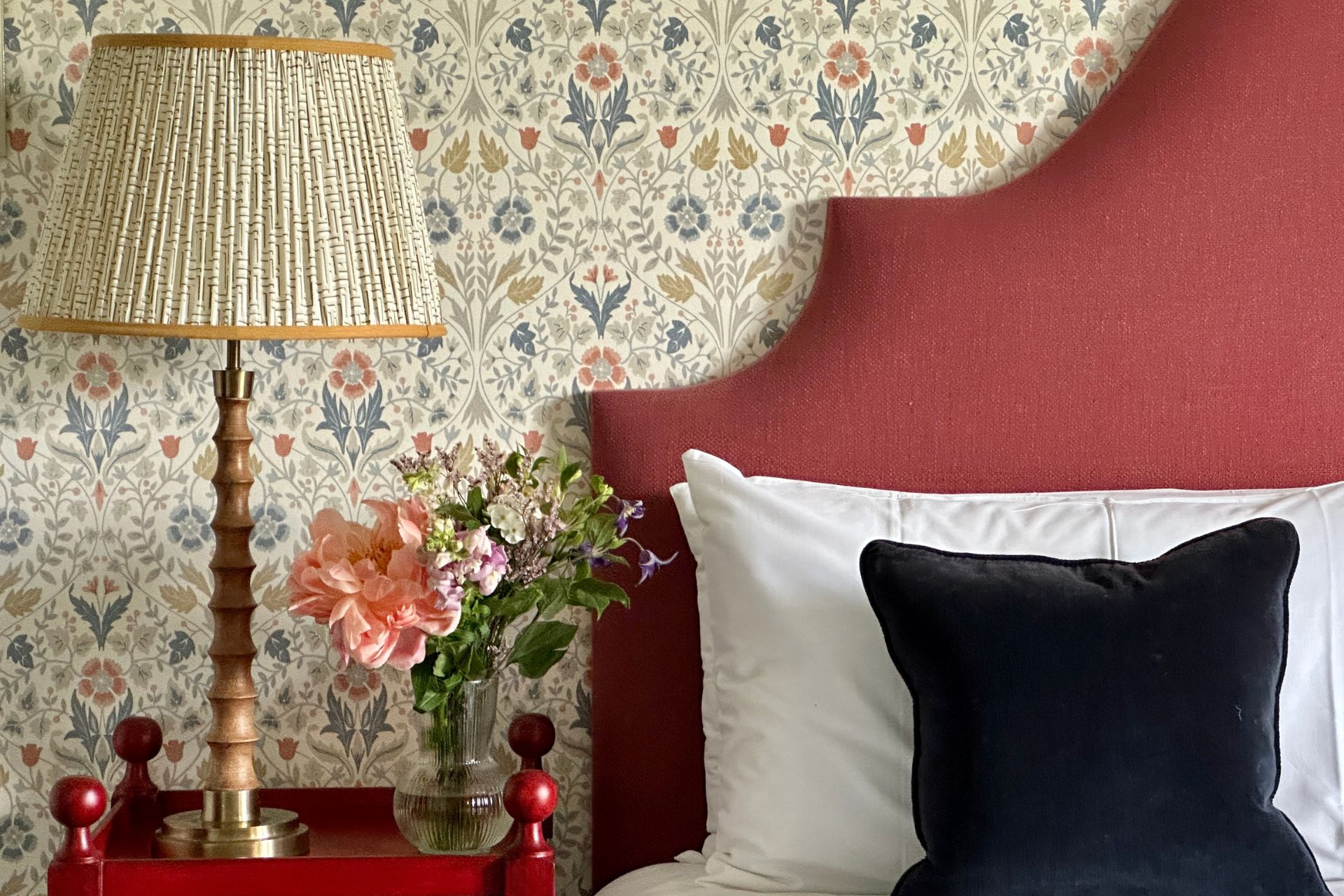
With its flagstone floors, wooden beams and original fireplaces, The Barnsdale in Oakham, Rutland proudly pays tribute to its rich heritage. Built in 1760 as a hunting lodge, the property operated as a working farm, part of the Exton Park Estate owned by the Earls of Gainsborough, until 1989 when it was first converted into a hotel. The late Lord Gainsborough would visit the farm to discuss milk yields from the dairy located in what later became the banqueting suite.
The latest addition to The Signet Collection, The Barnsdale, which opened in February 2023, has been transformed into an elegant country bolthole with 45 uniquely styled Taylor & Turner rooms, a lively restaurant, 1760 Brasserie, named after the year the lodge was built, romantic wedding barn, and spanking new spa, due to open 10 July.
The atmosphere is relaxed, friendly and decidedly unfussy with squashy sofas in the public spaces, a convivial rose-filled courtyard (which hosts a popular Christmas Eve carol service) and lots of sociable activities to choose from, such as chess, croquet and boules. The quintessentially English rooms feature pretty floral and striped wallpapers, frilled cushions, soft pink and green headboards and antique walnut bedside tables, and range from the more budget conscious classic (from £115) to the sumptuous. The open-plan Fort Henry suite (from £380 and named after an 18th-century folly in nearby Exton Hall Park) exudes interiors goals with its imposing copper bath, superking-size bed and warm palette. The honey-hued stable block houses the spacious and brightly painted Culture and Heritage rooms while eight Royal rooms boast prime views of the Rutland countryside.
Part of the hotel’s appeal is its laid-back (but not at the expense of efficient service!) approach to hospitality with all-day dining in the brasserie and sun-filled Orangerie, where you can opt for an express lunch menu of moules frites or chicken and radicchio salad and slightly more fancy fare in the evening, like Rutland Water trout tartare and cote de boeuf. Seasonal vegetables are picked from the kitchen garden while meats such as venison come from Exton Park. Make sure to order the sensational Signet signature snack, cauliflower popcorn, drenched in teriyaki and sesame. During our visit, the place was buzzing with both locals and visitors enjoying leisurely lunches or drinks at the Burley Bar. One party even arrived by chopper, causing a flurry of excitement when they landed in the grounds. During summer, the Whispering Angel courtyard bar does brisk business.
Countryside Spa
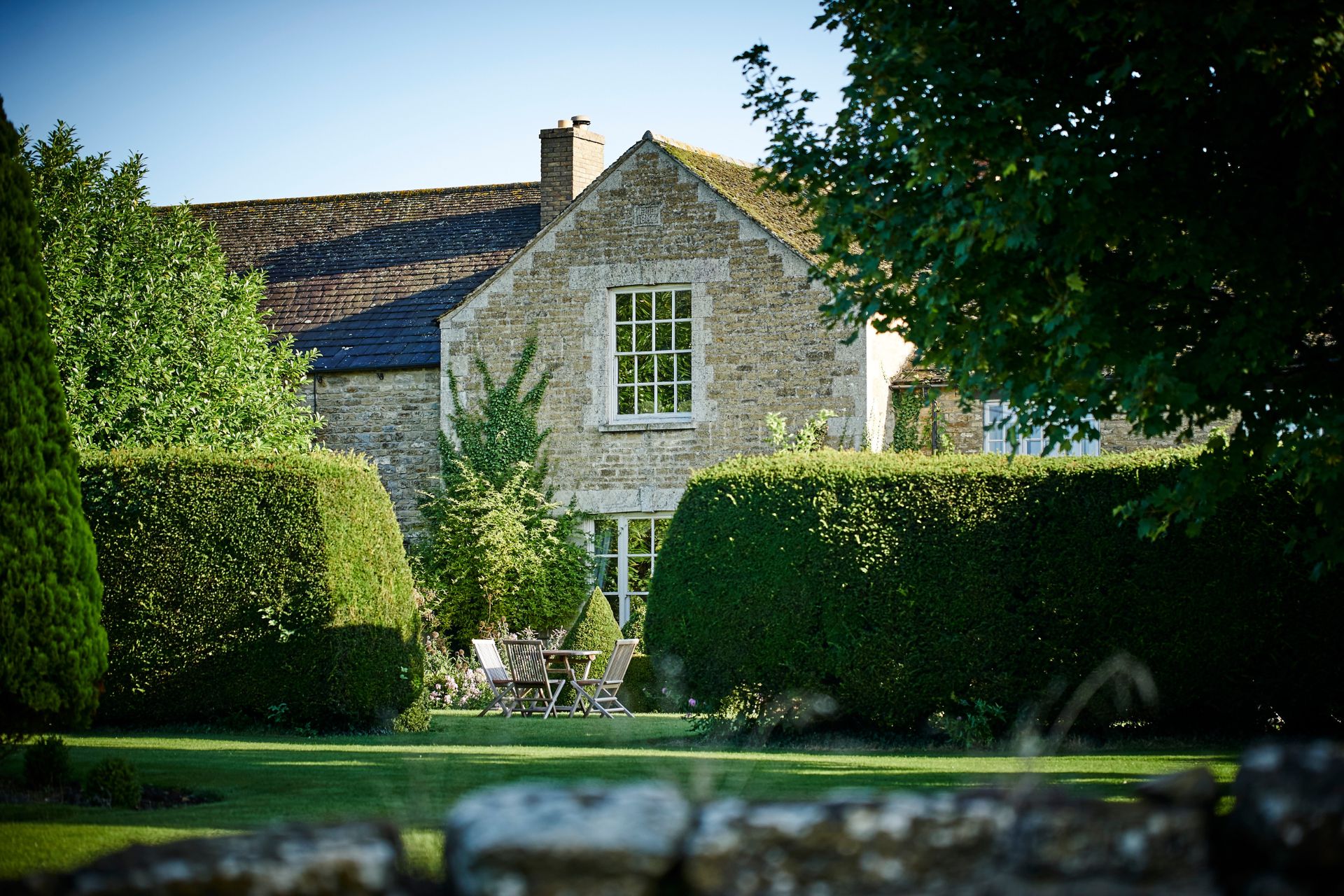
Rutland may be England’s smallest county but it certainly punches above its weight in terms of features and facilities. A short walk from the hotel is Rutland Water, Britain’s largest manmade reservoir, which offers a host of watersports, including fly fishing, sailing, and paddle-boarding. There are walking and cycling paths and historical sites to explore, such as the county’s most famous landmark Normanton Church, popular for weddings, and Oakham Castle, recognised as one of the best examples of domestic Norman architecture in England.
Back at The Barnsdale, guests will soon be able to book pamper sessions at the eagerly-awaited Signet Spa, complete with treatment rooms, sauna pod, wood fire hot tubs and outdoor heated pool. The highlight of our stay, however, was a painting session with Hertfordshire-based artist Nicola Watters, who made us feel like budding watercolourists as we worked, fittingly, on nature-themed compositions.
Rooms start from £115 per night. barnsdalerutland.com
Bull Burford
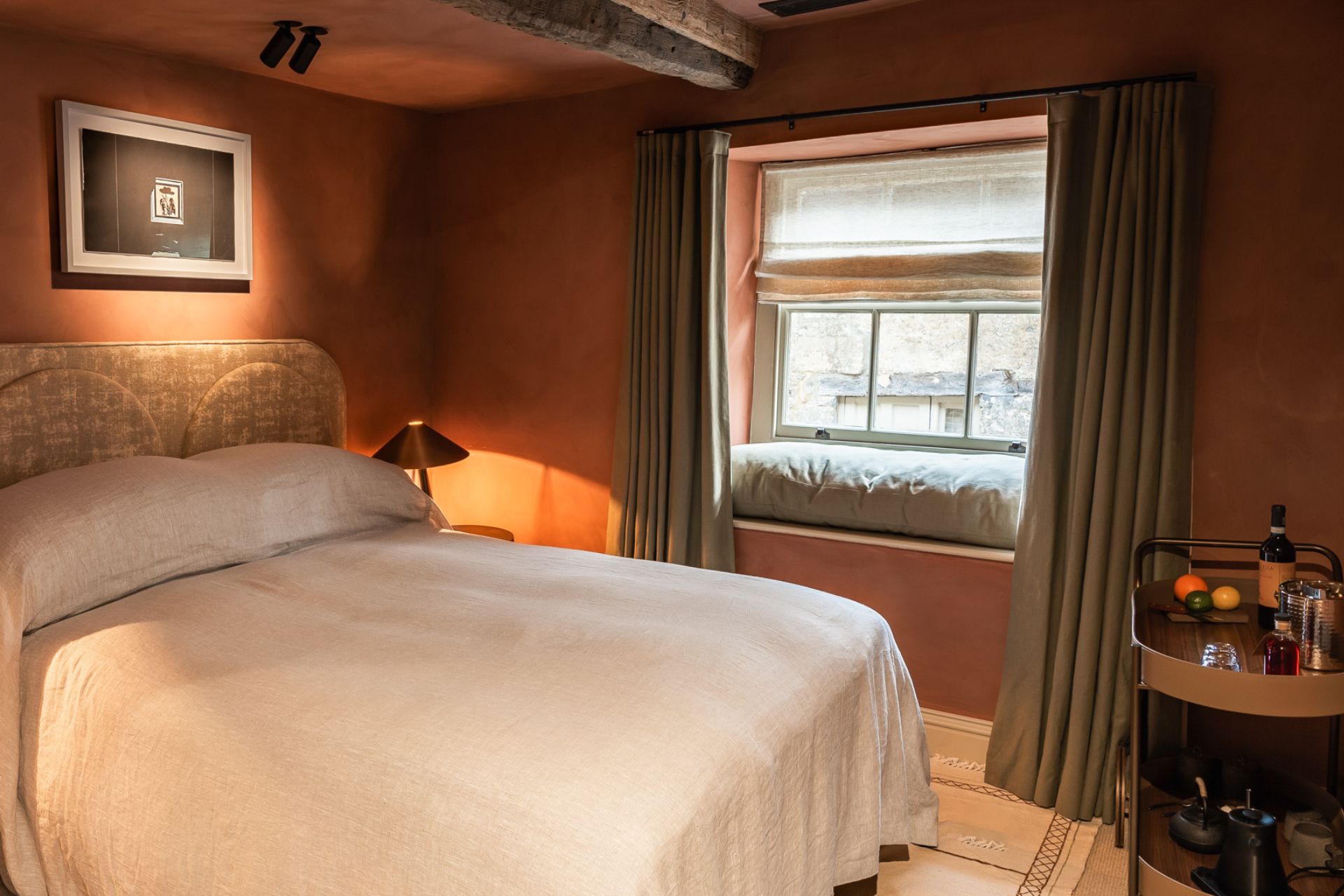
The beauty of Grade II-listed heritage hotel Bull Burford is that it manages to exude both style and sophistication while retaining many of its original features and much of its quaint charm. The 15th century coaching inn has been so sensitively restored that you wouldn’t be surprised to hear horses clip-clopping through the broad glass-door entrance today as they once did five centuries ago when the likes of King Charles II and his mistress Nell Gwynne would stop over for a night or two in the historic market town of Burford, gateway to the Cotswolds.
Indeed, some parts of the building are considered so exceptional that they can’t be touched at all, notably the oak-beamed, wattle-plastered side wall in guest lounge Herd, which could be painted but not treated or insulated. As the hotel’s owner and local resident Matthew Freud, who fondly calls it his ‘curious coaching inn’, tells me of the meticulous refurbishment project: ‘The key to Bull’s transformation was a fundamental respect for the history of the building. This was deeply challenging and made the building project longer and more costly than a cavalier approach.’
PR chief Freud, who runs London-based Freud Communications, explains that preserving the building’s many historic quirks required ingenuity, investment and lots of patience. ‘For instance, as with any building that was primarily created in the 16th century, doors used to be made to fit openings,’ he says. ‘It was much later that builders worked out it was easier and cheaper to make openings that fitted doors. Bull has 147 doors, no two are the same size, so we created a bespoke door factory on site, which fabricated each one.’
The sloping floors and wonky walls proved similarly challenging. ‘There are no flat surfaces, right angles or level floors,’ confirms Freud. ‘The easy approach would be to install boxes in each space but we chose to respect and celebrate the lines and honour their quirks. Each piece of furniture had to be customised on site to sit on sloping floors or fit a wonky wall.’ The attention to detail has certainly paid off.
Artful Living
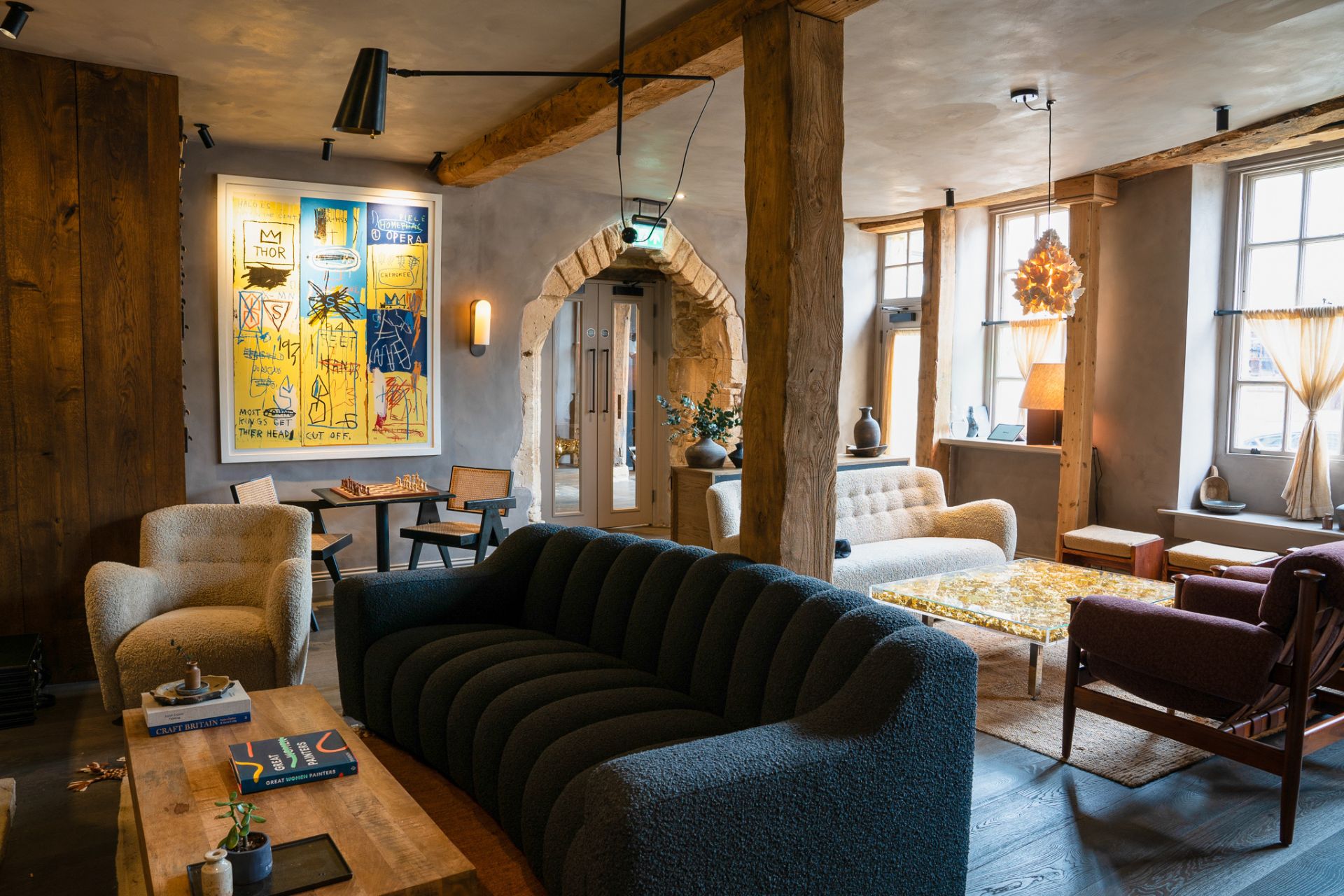
There are 18 exquisitely cosy rooms in calming earthy tones – all sumptuous neutral linens, lime-washed walls, exposed beams and soft lighting. Rustic furniture blends seamlessly with modern pieces designed for ultimate comfort, such as on-trend boucle armchairs and sofas. The marble-tiled bathrooms are as deluxe as those in any five-star hotel with freestanding bathtubs, rainfall showers, natural Wildsmith products and the most elegant curved mirror and sink ensemble I’ve ever seen. Each room includes a drinks trolley and wine fridge but there are mercifully no TVs.
There’s also no room service – guests are encouraged to graze at The Trough, a 24/7 snack station situated on the first floor and filled with the most delectable goodies, from home-baked pistachio cookies and fresh sourdough bread and doughnuts to assorted cheeses, charcuterie and vine tomatoes.
The easiest way to navigate the rabbit-warren corridors and wiggly staircases is to follow the modern art work like brightly coloured breadcrumbs (signage is non-existent as the idea is to make guests feel at home). Bull is something of a living art gallery with pieces pulled from Freud’s extensive personal collection and including works by Francis Bacon, Banksy, Jean-Michel Basquiat, Salvador Dali, Damien Hirst, Harland Miller and Andy Warhol as well as the owner’s ceramicist niece Martha Freud. A Bacon portrait of Freud’s uncle Lucian hangs over the stairs to the loos in Vincent’s Bar. The former post office-frontage is nondescript apart from a mirrored riot police helmet by Banksy that rotates from a ceiling chain in the window.
Community Spirit
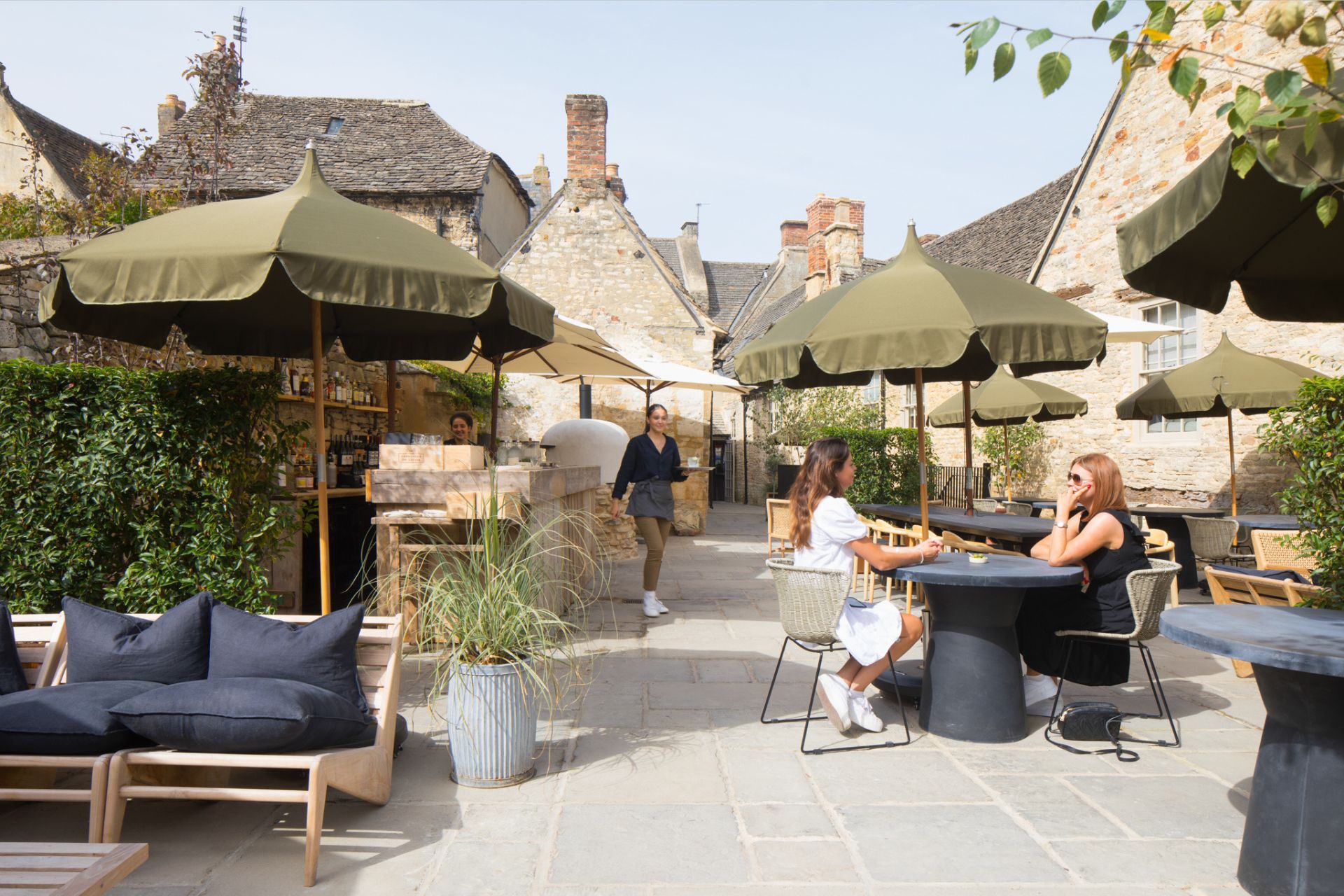
While the original plan was to encourage communal eating, specifically in what was formerly the breakfast room Herd, that policy was eased once it proved less popular than expected. But the sharing ethos remains with a table for eight in the main dining room Horn, which now serves breakfast, lunch and dinner, including a mean Sunday roast; the outdoor tented Wild restaurant, where steaks, seafood and vegetables from Freud’s own kitchen garden, are cooked at the Guy Ritchie-designed WildTable, and ten-seat omakase restaurant Hiro, which offers a 14-course tasting menu overseen by sushi masters Nobuyo Cash and Miya Cratchley. There is also the Terrace, where you can sip cocktails and listen to live music at weekends while munching street food prepared in a wood-fired oven. The vibe is informal, friendly and inclusive as locals mingle with townies and smiling young staff seem more than happy to engage.
The communal spirit extends to group activities and community-minded events, which are on offer to guests and residents alike – there are regular film nights, expert talks, chess tournaments, yoga classes, bookclub meetings and creative craft sessions. Freud, who sees these activities as therapeutic and believes ‘we all need to take a breath sometimes’, has even made his palatial Jacobean Priory available for games of Padel tennis in the grounds, flower arranging in the garden, foraging and bee-keeping in the woodland and choir practice by candlelight in the chapel.
Prices have come down, too, to make the hotel more accessible and less London-elite, with rooms from £210 per night and attractive deals for a two-night stay.
As Bull approaches its first anniversary this September, Freud reflects on its transformation into happening high street hub: ‘I am enormously proud of these observances (restoration work), which I hope have created a modern hotel that exists in harmony with its ancient host.’
Rooms start from £210 per night. bullburford.com



